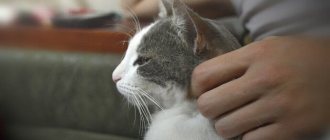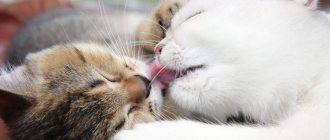The cat feels that there is freedom behind the door
Animals understand that thanks to the front door they can leave the house for a walk.
When you open the door, many enticing aromas enter your home. There is fresh air, the birds are singing. And for a pet this is the main sign of freedom. Therefore, they try to run away for a walk whenever possible. It’s good if the pet is accustomed to this and returns home in a timely manner. Otherwise, you need to constantly watch so that the cat does not escape through the doors or through the window. Some pets communicate in advance their own plans to escape through the door. They wait for any opportunity to jump out in the following situations:
In this case, the owner does everything possible to block the animal's access to the environment. But it hopes that it will seize the moment when they will not pay attention to it, and it will be able to slip out unnoticed.
Sometimes an adult cat, which previously had a place at the front door, may lie down in the passage out of habit.
Each animal has its own requirements, desires and character. And loving owners put up with this. Therefore, there is no need to scold an animal if it has chosen a place at the front door.
Hunger
A hungry cat makes sounds that sound like a baby crying. In this case, eliminating the cause of this behavior is quite easy; you just need to feed the animal. Often kittens cry due to malnutrition. They often feel hungry because their growing bodies require nutrients. Owners need to learn the rules for creating a cat menu and feed their pet on time. Sometimes owners mistakenly believe that they are giving the animal enough food.
However, there are times when a cat has just eaten, but runs around the table with human food and screams. “Why does the cat meow for no reason?” — this is the question the animal owners ask. This can be explained by the fact that pets are very gluttonous. Cats may beg for food when they smell delicious smells. In this case, you should not follow the animal’s lead. The pet should be taught to eat at strictly defined hours.
Cats often meow when their owners frequently change the types of food they eat. After all, the pet’s body gets used to certain foods. It is especially undesirable to alternate the intake of dry ready-made food and food from the human table. This can lead to digestive problems.
Why does the cat constantly yell?
Why does the cat constantly yell? Determining the causes of destructive behavior is the best method for solving the problem. Eliminating the cause of irritation is much easier than changing your pet's habits.
Let us immediately note that there are three main reasons for constant yelling:
Instincts cannot be changed through education; you need to come to terms with this right away. Physiological reasons are most often accompanied by discomfort, which the cat expresses by meowing. Psychological problems are always accompanied by stress, which can provoke both behavioral and physiological problems. Let's take a closer look.
Cats, like people, have introverts and extroverts.
If you do not have a clearly defined answer to the question of why a cat constantly meows, tied to a specific occasion (the cat is hungry, wants to drink or wants to go for a walk), then pay attention to the simple fact that meowing is one of the ways of cat communication.
Some cats just love to talk
By making the sound “meow”, a cat communicates with a person or other pets. Among cats, as among people, there are individuals with different temperaments. Some are self-contained, patient silent people (introverts), who silently suffer from hunger, thirst, and pain. It is necessary to show maximum attention to such animals - not only add food in a timely manner and change the water in the bowl, but also check their health status and play with the pet more often.
Others are emotional extroverts who announce problems right away, loudly and at any time of the day. Such cats simply love to talk, and a stream of continuous “meows” may mean that they are sharing their impressions with their owners or talking about their plans for the day. If you notice that your pet is excessively emotional and desires to communicate, do not ask why the cat constantly meows.
Among cats there are individuals with different temperaments
Attention! Extroverted animals need enough attention, but you shouldn’t pamper them, because by responding to the first requirement, you can ensure sleepless nights entirely devoted to your cat.
One of the characteristic features of talking cats is to respond to the voice of their owner. They can behave calmly and remain silent until the moment you remain silent. But as soon as you answer the phone or start communicating with household members, the cat immediately joins the dialogue. And stopping him turns out to be difficult.
What does the sign say if your own cat sits at the front door?
This behavior of a pet may not mean anything special at all. An animal can behave this way when it is hot, and you can always lie down in a draft near the front door.
If a cat, after sitting at the threshold for a while, runs away, this may mean the imminent arrival of guests. The sign is accurate, so you can rest assured and prepare treats for the table in advance. Cats have increased sensitivity to any vibrations caused by any changes in the environment.
These animals sense that an owner or guest is approaching when they are kilometers away from home. Experts today cannot explain this feature of a cat’s sense of smell.
It also happens that a beloved pet lies down on the threshold, as if saying with all its appearance: “I won’t let you in!” In this case, it is better not to leave the house for some time, because the animal probably senses danger, which the owner cannot avoid if he leaves now. In such a situation, it is better to trust the cat and delay leaving.
If a cat washes itself, this is also a special action in folk signs. Washing at the door means that guests are arriving, and everything is not so simple. It matters which side the cat washes itself on. If a cat washes itself on the left side, unpleasant guests will come, along with which negative energy will penetrate the house. A cat washes the right side - good people will come and fill the house with positivity.
Reasons for cat concerts related to the pet's age
If constant meowing accompanies the owner of a small kitten for several days or weeks, then the situation is completely justified by the age of the animal. The kids are fearful, confused, they are in an unfamiliar environment and are experiencing stress. But if an adult pet meows without pauses or stops, then you need to look for other reasons.
Kittens meow because they are constantly hungry.
Experts say that there is always an explanation for continuous meowing - a cat will not scream for no reason at all.
The kitten meows because:
- he is lonely and unusual in the new house, he is looking for his mother cat, does not find her and constantly calls, the baby is surrounded by new people and unfamiliar objects, he feels unprotected;
- kittens are actively growing and gaining weight very quickly, so it is quite possible that the usual portion is no longer enough for them, and they constantly feel hungry, which they report to the owner;
- kids are very restless and find a toy in any object: curtains, a ball of thread, a rug on the floor, but they often become captive of the newfound fun, and when difficulties arise that they cannot cope with themselves, they call on their owners for help by meowing;
- if the kitten is in complete order - he is well-fed, healthy and has not gotten in anywhere, but continues to meow, it means he lacks attention.
The cat screams when no one is home - reasons
If your pet starts screaming when no one is home, you have a long and patient job ahead of you. You need to start by recognizing the problem. It is important for you to make a firm decision to correct your pet's behavior, because if you act inconsistently and irregularly, your pet's behavior problems will only get worse.
Advice: try to accustom your cat to a harness and walks. Regular change of environment gives a lot of emotion and allows you to spend energy. In addition, cats are naturally very curious and tend to explore the world around them.
Before you begin to correct behavior, you need to find a stimulus that will motivate the cat to the desired actions. Depending on your pet’s temperament, you can use the following as motivation:
It is important to understand that cats do not obey those who do not love them. It may be hard to believe, but four-legged animals are great at sensing human intentions. If you are irritated and very angry with your pet, it is better to silently go into another room and close the door.
Interesting communication with your pet will allow you to establish strong interpersonal contact and quickly achieve what you want from your cat.
Important! Rest assured, problems with your pet’s heart-rending scream will be resolved immediately after he finds another way to expend energy, naturally, provided that he is healthy.
Your cat may be crying alone because he's bored. Make sure your pet has ways to have fun and compensate for natural needs:
The next important step is setting priorities. The cat must understand that the main thing in the house is the owner. In addition, the pet must clearly distinguish between your reactions. Simply put, if you are unhappy, you need to express it in such a way that the pet is sure to understand you. In order for the four-legged dog to understand the contrast between positive behavior and negative reactions, it must be praised often.
Tip: try to celebrate all your pet’s good deeds with praise, an affectionate tone, stroking and other rewards. In this case, when your pet performs an undesirable action, your negative reaction will be bright and contrasting.
Try to play with your pet as much and as often as possible, as this is the most reliable way to spend energy. Be sure to use safe, familiar accessories for play. In this case, your pet will have the opportunity to have fun independently and in the usual way, even if you are not at home.
Cats can harass even the calmest owner. A situation occurs when an animal begins to scream heart-rendingly at night and in broad daylight. No normal person can calmly come to terms with this, and sometimes it seems that screaming gives the animal real pleasure and there is no other reason for this behavior. But before you learn how to stop a cat from yelling, you need to study the reasons that prompted the animal to behave this way.
sample deed of gift for a dacha between close relatives
The main reasons why cats get restless at night, why do they scream?
If we are talking about uncastrated cats and unsterilized cats, then at such moments their natural desire to reproduce prevails. Therefore, with such cries, representatives of the cat family invite potential soul mates, informing them of their readiness to reproduce.
It may happen that the animal screams because of illness or some kind of ailment that causes him suffering. For older cats, this could be a nervous disorder or Alzheimer's syndrome. Abdominal pain can plague animals of any age. And this can be understood by feeling the pet’s belly - its hardness will clearly indicate that this is the cause of concern. In a cat that has always been calm and suddenly begins to exhibit similar behavior, the cause may be common worms.
Urolithiasis bothers older animals, manifesting itself most strongly after it relieves itself. A clear confirmation of this is the cat's anxiety and screams after he leaves the tray. Neutered cats who have had part of their ovary retained may also experience anxiety and screaming.
Kittens suffering from lack of attention and trying to demand a treat or game from their owner also scream. Moreover, having received what they want, they very quickly remember the method by which they can achieve what they want and use it again and again. In addition, a kitten that has been weaned from its mother and just brought into a new home can behave very restlessly. He may refuse to eat, walk everywhere and scream, calling for his mother. If a kitten screams at night, then over time he will get used to it, adapt and stop such screams.
Also, a cat's screams can mean anxiety. It’s not for nothing that cats’ so-called sixth sense is so acute that since ancient times people have used them to predict various natural disasters, such as earthquakes. The pet's anxiety in this case may have the purpose of warning the owner about something. But such behavior, of course, is not observed every day, but only occasionally.
The possessive nature of cats forces them to mark their territory to prevent other animals from claiming it. But in order to reinforce the marks with more eloquent actions, cats declare their rights with such loud cries.
Other folk signs about a cat at the front door
Situations with a cat at the doorstep can be very different, and in each specific case the explanation will be different. For example, a stray cat may appear in a person’s life, or a cat who is about to give birth to kittens. Each of them will come to protect and take away the negativity.
A folk superstition says that once a cat appears on the doorstep, it needs to be taken into the house. This animal will rid the house of negative energy, and the owners will thus get rid of the evil eye and damage.
If a single guy or an unmarried girl finds a cat at the doorstep, this is a sign to them that changes are soon expected in their personal life, and they will be happy if they take the cat into the house. Such an acquisition will end with a meeting with your soul mate, and then the wedding will not be far away.
By picking up a stray cat on their doorstep and sheltering it, the owners will be able to deal with all the problems that have befallen them, and the dark streak for them will end. In this case, the animal is a messenger of the Higher Powers, thanks to which everything in people’s lives will improve.
It happens that a pet will take a shit at the doorstep, but this is not a reason for anger or worry. If you believe the popular belief, this is a sign that joyful days will soon come. Improvements should be expected in the area of finance, and in everything else everything will go well.
Seeing a cat with kittens on your doorstep is a sign of financial profit. The family should be taken into the house, and then the kittens should be distributed into good hands.
How to stop a cat from scratching furniture using improvised means?
Fill the spray bottle with water. And as soon as your pet starts tearing up the sofa or other unauthorized place, sprinkle water on it! There will be no harm to either the cat or the furniture, but the pet will begin to associate its favorite activity with unpleasant phlegm!
If you are thinking about how to stop a kitten from scratching the sofa, then this method is unlikely to work. Usually, kids accidentally damage furniture while playing. They begin to climb the curtains, try to conquer the sofa, the carpet hanging on the wall - this is normal behavior. If you pour water on your kitten every time he plays, you will simply grow a nervous creature, apathetic to everything. The same applies to scaring sounds.
Cats and entrance doors. Catch Me If You Can.
Running out the door is a potentially deadly behavior.
Cats that are not used to being outdoors are at serious risk. They could be hit by a car, attacked by other animals, get lost, eat poisonous bait, or fall prey to other dangers. No matter what your cat does when she escapes the door, whether she sits on the porch or stays in the yard, she is still in danger. This behavior must be corrected.
Correcting the behavior of fugitives.
First, stop petting and rewarding your cat when you are near the door. The cat should not receive your positive attention at the door. Chances are, it's very typical for you to lean over and greet your cat as soon as you open the door. Most likely, the cat is immediately waiting for you, running under the door as soon as she hears you turn the key in the lock. Now you should organize another place for greeting after work, which will be as far from the entrance as possible. You can arrange an official place for greetings and farewells at the other end of the apartment or house. This could be a cat tree, a windowsill, a chair, anywhere your cat likes to sit. Start by luring your cat to this area. You can call her name and then reward her with a treat when she goes in the right direction. You can use a fishing rod toy for bait. If your cat loves to be petted, call her to this spot and pet her as soon as she gets there. If you use a clicker to correct your cat's behavior, you can click and reward him every time he sits in that spot. Now all your greetings and farewells should take place here. All family members, without exception, must adhere to this rule. Make sure that to reward your cat you choose a treat that is so delicious or a game that is so interesting that the pleasure is much stronger than its desire to run out the open door. Reward your cat every time she says goodbye or meets you in this place. When you open the door to your apartment at the end of the day, do not look at your cat or greet him until you are in the formal greeting and goodbye area. This is where you can hug, kiss, lavish compliments and give treats. Keep treats nearby in a container (or even save some in your pocket) so that you can reward your cat when she comes to greet you. When you leave for work in the morning and your cat is following you and looking at the door with the intention of jumping out, throw her a toy or food puzzle with her favorite treat inside at the other end of the room, a second before the door opens. The food puzzle will keep your cat entertained throughout the day.
Weaning rules
Any owner must remember that if a previously calm and affectionate animal begins to cry heart-rendingly, especially in the morning, it is necessary, first of all, to contact a veterinary hospital. A qualified specialist will help you find the problem and suggest the right way out of the situation.
Unneutered young cats that scream heart-rendingly to attract a female should be allowed to go for a walk. Without planning to receive offspring from such a pet in the future, it is recommended to perform a procedure to remove the reproductive internal organs.
You can use special hormonal and herbal medications to suppress sexual instincts. But in this case, it is important to remember that various drugs that act on the body from the inside can lead to serious consequences and complications in the future.
Note! Neutered cats can continue to scream. As a rule, this occurs a short period of time after the operation.
It is necessary to be patient as this is related to the circulating amount of hormones in the bloodstream. After some time this goes away.
It happens that sterilized cats continue to scream. In this case, this indicates an unsatisfied instinct of the hunter. It is recommended to introduce the animal to active exercise, which includes imitation hunting and various active games. This will allow the animal to spend more energy reserves, and at night the pet will have a good rest.
Veterinarians advise giving hyperactive kittens heavy food before bed, which the body will spend more energy processing. But this advice should be avoided by owners of already neutered cats. This is due to the fact that heavy food and large quantities of it can provoke the onset of obesity.
How to stop a cat from yelling at the door
In the process of weaning a cat from yelling at the door, you need to show maximum patience. These animals are wonderful teachers. They “train” a person (their owner), making him comfortable for them, so that he obeys all commands. You cannot give in to a cat when he behaves badly. By giving in and doing as the animal demands, the owner shows that this screaming technique works and the result can be consolidated.
Punishing a picky pet should also be done wisely. Even if the owner thinks that the cat is yelling for no reason. Under no circumstances should you use physical force or hit a cat. Proven methods for distracting attention will help in this matter - water or a sharp sound. You can spray a spray bottle on the cat’s tail, and the animal will be busy for a while washing itself and putting its fur in order.
Note! If the owner sees that the pet is about to start yelling, you need to switch his attention as quickly as possible - hit the pan, slam the door, or offer some kind of noisy game.
Stop demanding food
An important aspect is setting house rules. As soon as a small kitten appears in a human family, it must be trained from the first days, without allowing much liberties. It is necessary to establish clear boundaries where the animal can go and where it is prohibited from going.
It is important to create a feeding schedule so that the animal gets used to the time when food is given to it. This will avoid the moment when the cat starts yelling and demanding food. As soon as the cat begins to scream heart-rendingly, you can try to command it “Quiet!”, in a calm and dominant tone.
After completion, it is important to praise your pet, and sometimes give a treat. Don't expect your cat to behave appropriately right away. It takes a lot of time for the animal to understand what the problem is and change its habits.
Latest Chinese warning
It is possible that you are busy and cannot devote much time to your pet. At least as much as he needs. He may choose this method (by the way, not the most outrageous one) to remind you of your responsibilities: playing together, talking, ironing the back and scratching behind the ear.
As you can see, there is no paradox or mythical cat harmfulness in the “closed door syndrome”!
Subscribe to our channel and learn more interesting and useful things about cats!
Source
What to do if the cat is sitting at the front door?
With natural exploratory instincts and a sense of intimacy in their space, cats love to have access to all available spaces. That's why you may be scratching your head when your favorite feline chooses to spend a significant portion of its time parked in front of your front door. So, have you ever asked yourself why is my cat sitting by the door?
Cats sit by the door for a variety of reasons. More often than not, they want to go outside (if they are indoor or outdoor cats) to see what's outside and potentially escape (if they are outdoor cats) or wait for their people to come home.
private sector guest houses in Vityazevo
Cats are intelligent, curious creatures and rarely do anything without a good reason. Whether your cat is an indoor cat or an outdoor cat, he is genetically programmed to withstand the call of the wild to hunt for prey. Once inside, the cats realize that there is another world beyond the front door. In this article, we'll look at the various reasons why cats sit at the front door and what you can do to correct the behavior.
Why does a cat yell for no reason and what to do?
Most people get a cat expecting only positive emotions from it. It's nice to hold your pet and hear a quiet purr in response. But do not forget that a cat is a living creature, capable of splashing out not only positive, but also negative, and without much embarrassment. Among the cat family there are calm and emotional individuals. The first category can completely hide stress, health problems, and grievances against the owner; the second category will notify everyone of their indignation with a loud meow or with a rending cry.
Why does the cat meow at the front door?
Meowing at the front door is often a not-so-gentle invitation from your cat to open the door. They will emphasize this point by carefully looking at the door, at you, and back.
Cats, unlike rabbits or hamsters, are incredibly vocal. Their howls and meows are their highly expressive methods of communication. Especially if your cat spends time outside, this is the most effective way to let you know that she is ready to jump out again.
© shutterstock
It's also possible that your cat's sensory receptors are picking up tantalizing smells or sounds that belong to the creatures on the other side of that piece of wood. She wants to see it for herself!
The cat constantly meows to go outside
Some cats seek more stimulation than others, while some are noisier.
If you are trying to help your cat transition from an outdoor cat to an indoor cat, it may take some time to curb this interest. You can train your cat to stop meowing at the door, just like any other unwanted behavior.
Take your cat away from the door and do something fun. Use treats to reinforce desired behaviors, such as quiet play or scratching posts.
The next step will be difficult - ignore the meowing! Although your pet's muted tones may be difficult to turn off, a lack of response to howling will send a message that these habits are not encouraged.
10 Reasons Why Cats Meow Loudly and Incessantly
Sometimes it seems that a cat meows for no reason, but this is a signal that the pet is worried about something and requires attention.
Mother's call
A loving mother cat communicates with her kittens in a special way. She notifies her offspring with chirping sounds that she is approaching, so that they do not get scared, because their eyes are closed for a long time and they cannot see who is nearby.
By meowing, the cat calls the cubs to eat. Hearing the mother's purr, the kittens begin to actively move and look for the nipple. The cat may “yell” at them if they move too much, scratch or bite her. This is how the animal makes them calm down.
Another type of meowing from a lambing cat is an alarm signal. If the kittens are not found in their usual place or if someone picks them up, the pet may scream loudly. But as soon as the cubs are returned to the “cat’s nest,” the cat stops screaming and begins to lick the babies to rid them of the human smell.
Finding a toilet
Cats carefully choose a place for the toilet in the apartment and hide the results of defecation. If an animal really wants to pee, but cannot find the right corner for itself, especially under the strict supervision of the owner, then it begins to get nervous and meow loudly.
In the case when the cat already knows where he needs to go to the toilet, but screams every time he sits in the tray, the person should take the pet to the veterinarian. This behavior is most likely caused by constipation, anal fissures, urinary tract inflammation or other diseases related to the pelvic organs.
Trying to get attention
Cats have lived next to humans for many centuries and are strongly attached to them. Loneliness and lack of affection makes them scream. Meowing, they ask the owner to pay attention to themselves, to play with them, to stroke them or just to hold them in their arms. To calm an animal that feels lonely, it is recommended to buy it a lot of toys and build a corner where it can climb and jump. If a cat easily gets close to its relatives, then it is advisable to make a friend for it.
If the animal is too annoying and interferes with work or doing chores around the house, you can moisten its fur with water. It will start licking and stop bothering its owner.
Hunger
Hunger is one of the common reasons that causes an animal to meow loudly. The cat cannot say directly that it wants to eat, so it has to scream. This usually happens when a person is in the kitchen. The pet, spinning around its owner, makes characteristic sounds, rubs against its legs, jumps, and clings to clothes with its claws. To calm him down, you need to feed him.
Sometimes this happens when the cat has already been fed. Scientists have found that no animal asks for food if it is full. Therefore, when your pet has eaten, but still screams, you need to give him more food, since he is not full.
By the way, not only hunger causes long and loud meowing. Cats scream when they are thirsty or the food offered to them is not suitable. In this case, the owner of the animal should carefully monitor it, change the water in the bowl, or review its diet.
Stress
A trip to the veterinarian, moving, the arrival of a new pet in the house, etc. can cause stress in a cat. Some animals experience it silently, others lie in one place for a long time and breathe frequently, sometimes with their mouths open. The rest may not hide their well-being and signal it with a loud cry.
It is very difficult to detect if a cat is stressed. The owner should carefully analyze all the events that have happened to the animal over the past few days. If he recently went to the doctor or a dog appeared in the house yesterday, then there is no need to worry. It is enough to pay more attention to your pet, pet him and feed him tasty food, and everything will be fine. Otherwise, you need the help of a veterinarian.
Search for a partner
Females almost always meow during sexual activity (estrus), males do this less often. In this case, the sounds made by the animal are soft, musical, and in low tones. They are supplemented by rolling on the floor, rubbing the head or torso on furniture.
Solving the problem of a pet meowing while looking for a sexual partner is difficult. It's no use yelling or spanking him. It's all about hormonal levels. The only correct option is to buy special drops at a veterinary pharmacy:
- Stop intimate;
- Counter-Sex;
- Sex Barrier;
- Gesterenol.
They are given to the animal for several weeks until the hormonal balance changes. However, no one can guarantee that after 10-14 days the cat will not start asking for a cat again.
Another solution to the problem is to sterilize the cat. The cat can be neutered. However, if an animal of an elite breed is used by the owner for breeding, then it is better for him to mate with a suitable partner.
Showing love
Meowing does not always mean that the cat needs something from its owner. It happens that an animal begins to purr and mewl when a person passes by. This suggests that it is pleased with the presence of its owner and thus expresses its disposition towards him. At the same time, the pet does not ask to be held and does not get underfoot.
Disease
Pain often causes the animal to meow. And this is not necessarily an injury. Certain internal pathological processes cause discomfort to the cat, and she begins to scream for a person to help her. And the louder the meow, the stronger the pain, which becomes a reason to immediately take the animal to a specialist. It is especially important not to delay a trip to the doctor if the cat is old or has chronic diseases.
Excess of adrenaline
While playing with another feline or with objects, the pet becomes very interested in what is happening. The adrenaline produced in the body causes the cat to scream involuntarily. For many, this behavior is atypical, but it does happen.
Cats have more than three hundred different sounds in their arsenal, with the help of which they talk to humans or relatives.
People who study cat psychology say that if an animal screams during active play, it may mean that it is inviting its owner to join it. You cannot scold a cat for such behavior. It is a natural expression of fascination and excitement when an object (a toy or play companion) escapes the clutches.
Communication with relatives
One famous felinologist said that cats only communicate with people by meowing. Actually this is not true. Animals use these sounds to communicate with relatives, express their own emotions, and scare away enemies.
If cats meow in company, it means that they are talking to each other. The intensity of their voice can tell how friendly the conversation is. If animals scream loudly, then most likely they are swearing. A person should not interfere in “cat feuds”. But, if scandals occur at night, then you can spray them with water so that they calm down and do not interfere with sleep.
Why does a cat sit at the door at night?
Cats are predominantly nocturnal. These sounds and vibrations of running animals are likely to be amplified for your pet at night, triggering his predatory instincts.
A cat's internal clock may be on a different schedule just because your policy may be "early to bed." They may innocently assume that a magical hand will appear and let them out if they wait long enough.
If letting your cat out at night is not on the schedule, there is no need to react to this waiting game. Eventually, this behavior must go away because it is continually not rewarded.
Why does the cat try to run out the door?
As we explained earlier, nature is the biggest playground for cats. Whether indoors or outdoors, cats want to be where the action is.
There are several reasons why a cat might try to run past you as soon as the door is opened.
Running communicates some kind of urgency. Perhaps something outside has piqued your cat's curiosity so much that she can't wait to investigate. Maybe a passing dog? The neighbor's cat?
© shutterstock
If your cat lives strictly indoors, this rushed behavior could be a sneaky attempt to get at the forbidden fruit. Your cunning cat may try to take advantage of your food-filled hands for her one chance to finally satisfy her desire to go outside.
This behavior can go from annoying to downright dangerous. However, there are steps you can take to break these habits.
What to do
The first step is to make sure you are not reinforcing unwanted behavior by making the doorway a focal point. When you walk through the door, don't stop there; move to another place in the house for hugs and kisses.
Another solution is to place a training mat by the door made of a material that is not comfortable for your cat's paws. Just remember not to step on it yourself when you're not wearing shoes.
To compete with the charm of nature, you will need to provide your pets with equally attractive alternatives. Here are a few things you can do to decorate your interior space:
You may have noticed that your cat gets offended when any door in your home is closed. Cats avoid the concept of restricted access; they need the freedom to explore where they want, when they want. Doors with windows are even more attractive to them as they like to keep an eye on what is happening outside.
Source
I have a cat (lazy and phlegm) and a cat (an awl in the butt and the need for constant communication) living at home. In the spring it will be 2 years. Both castrati.
Recently, the neighbor across the street (the door is directly opposite ours) got a cat (or cat, I don’t know). So now mine is just going crazy. He sits under the door and starts crying. And yesterday she generally rushed at the door, squealing, scratching the wallpaper, the door, jumping, pulling the handle.
At first I thought that the cat simply lacked communication. On the 8th I took my selection with me for a while. Also a cat, about a year old. He doesn’t let cats near him, hisses and rushes. The first days the cat was very happy with the new girl and tried to play with her, after 2-3 days she realized that the new girl was not making contact and began to react more aggressively. But for about a week she did not react to the neighbor’s cat. And yesterday it started again, with triple the force. As a moral lesson, I even let the cat out into the common corridor and closed the door. But she didn’t even think about sitting under the door and asking to go home, but walked with interest in the corridor and sniffed the next door, meowing under it. After 7-10 minutes, I couldn’t stand it and took her back (I was afraid that one of the neighbors would open the common door and the cat would be pinched or even taken away or thrown out).
The cat went completely crazy after that. She was banging on the door and screaming, running up to me and like a bullet to the door, saying, let me out.
In general, is it really possible to somehow distract the cat from these songs under the door? The neighbors probably think my cat is in heat. And that the cat is Siamese))
Source
What other ways are there to solve the problem?
Repellent sprays
How to stop a cat from scratching at the door if nothing helps? One of the methods is to use unpleasant odors , because cats are very sensitive to them, since they have a sensitive sense of smell.
Pet stores sell special sprays with a repellent odor . Spray the door with it, and the cat is unlikely to want to approach it. The main thing is to remember to use them regularly, as odors can dissipate.
If you want to save money, you can try making a homemade spray with a similar effect. To do this, squeeze a lemon or orange into water, pour it into a spray bottle and spray the door or the area next to it.
Cats don't like the smell of citrus fruits, you can take advantage of this
Upbringing
education , the most reliable and proven method, will help to wean it off once and for all
Praise your cat every time he uses a scratching post instead of a door. Along with praise, it doesn't hurt to give him a treat . You can use the negative reinforcement method. Threaten your cat in a stern voice when he breaks your rules. Although cats do not understand words, they sense intonation .
Double sided tape
A controversial method, because if the tape comes off, it will most likely stick to the cat. And if the cat is curious, he may feast on it, but the consequences may not be very good. But if you constantly monitor the cat, then the method will work.
The fact is that cats do not like sticky surfaces . If there is double-sided tape on the door, the mustachioed person is unlikely to like it. The door will remain alone, and this is what we wanted.
An alternative to double-sided tape can be a special tape Sticky Paws . It was created for naughty cats like yours.
Devices with motion detection
How to stop a cat from scratching at the door at night? A good way is to use automatic devices that will guard your sleep while the cat is awake. One of these is the Argus . The motion detector will understand when an enemy is approaching the door and will give the command to shoot compressed air . The result is capitulation. The solution is not bad, but temporary. For example, at night. During the day it will not be very convenient, since the motion detector will be triggered when you simply pass by. Another disadvantage is that the cylinders need to be changed regularly, and this is an extra item in your budget.
You can also perform the function of the device. Buy an air sprayer from a pet store and use it as directed whenever your cat damages the door. According to animal psychologists, this is one of the most humane methods.
Why does the cat constantly yell?
Why does the cat constantly yell? Determining the causes of destructive behavior is the best method for solving the problem. Eliminating the cause of irritation is much easier than changing your pet's habits.
take out a mortgage on a private house without a down payment
Let us immediately note that there are three main reasons for constant yelling:
Instincts cannot be changed through education; you need to come to terms with this right away. Physiological reasons are most often accompanied by discomfort, which the cat expresses by meowing. Psychological problems are always accompanied by stress, which can provoke both behavioral and physiological problems. Let's take a closer look.
How to wean a cat from the bad habit of yelling?
Advice! The best way to ensure a peaceful life together with an animal is not to spoil it and not allow everything it wants at the first request.
Cats are smart enough to understand that humans don’t always like their meowing, and that their owners are ready to make any sacrifice just to stop it right this second.
This is not even a question of why a cat constantly meows and screams if you have indulged all her whims since childhood, the question is different: is it possible to fix everything?
It is possible, but for this you will have to stock up on Spartan endurance and angelic patience. The cat, out of habit, will demand and meow, and the owner should simply ignore her cries. If you are not confident in yourself, buy earplugs or listen to music through headphones, because a constant cat concert is unbearable.
Try not to spoil your cat so that he doesn't meow all the time.
If a cat asks to be held in your arms with a heart-rending meow, do not follow the animal’s lead, caress it when it is silent and behaves calmly. The same goes for treats. Regular food should always be present in the cat's bowl, and the pet will receive yummy food only when it is silent.
The cat will learn this logical chain: “I’m silent - I get what I want” quite quickly. Usually training takes 5-7 days.
The cat screams at night
Cats tend to be active at night, as in the wild they begin to hunt at sunset. Thanks to the special structure of their eyes, cats see perfectly in the dark and are considered universal night hunters.
One of the most common reasons why a cat cries at night is a lack of physical activity during the day. If your pet sleeps all day, interrupted by eating and going to the litter box, there is nothing he can do to stay healthy except to be active at night.
Most cats, even those that receive adequate exercise, exhibit short periods of activity during the dark hours.
Usually the activity lasts 10–15 minutes, but during this time the cat actively runs, sharpens its claws, screams, and behaves defiantly. After a burst of activity, the pet calmly goes to the lounger and falls asleep for the whole night. If the cat does not receive adequate exercise during the day, bursts of activity can last for hours.
Is the cat screaming for no reason?
If you are sure that your pet is getting enough exercise and is screaming for no reason, contact your veterinarian before jumping to conclusions. Night cries may be associated with latently developing diseases.
The most common disease, the first symptom of which is the heart-rending cry of a cat, is urolithiasis. With urolithiasis, urine accumulates in the bladder and cannot exit through the urethra because it is blocked by sand or stone. Trying to empty the bladder, the cat experiences acute pain, as a result of which it screams.
Urolithiasis may be indicated by:
If your cat only cries at night, it is likely that she is reacting to stimuli that she does not hear during the day. The pet may hear the movement of rodents under the floor or in the walls, the crackling of electrical wiring, suspicious sounds from neighboring apartments or from behind the front door.
What to do if a cat is yelling under the bedroom door?
Many owners prefer to sleep with cats, but when trying to train their pet to sleep on a bed, they encounter a number of behavioral problems. A heart-rending scream under your bedroom door is nothing more than a test of your nerves' strength.
Interesting! If you decide to change your routine in one day, without preparation, because you wanted to, a panicked and hysterical reaction from your pet is quite expected.
If you decide to accustom your cat to a bed, act progressively. For the first few nights, place the bed in the bedroom as this will be more familiar to the cat. Only after the pet has come to terms with sleeping on a lounger within the bedroom can you try to move it to another room.
Reasons for screaming
Understanding the reason for the cat’s behavior will help the owner not only eliminate the problem, but also create maximum conditions so that the situation does not recur.
The main reasons when a cat constantly yells are:
- Hormonal surges;
- Serious illnesses;
- A way to attract attention;
- Feeling of fear;
- Upholding territorial integrity;
- Yearning.
Hormonal changes. One of the main factors that causes a cat to behave quite aggressively. Cats who have not undergone the procedure of removing the gonads (castration) bawle with enviable regularity about their desire to see cats in their territorial proximity. The instinct of procreation in animals is developed at the highest level, but cats do not experience pleasure. During periods of hormonal surges, cats experience physical and psychological suffering. Animals cannot overcome their instincts, so there are two ways to solve the problem - find a mate for the groom, or take him to an appointment with a qualified veterinarian and perform castration.
Various diseases. Neutered cats can also scream at night, just like their uncastrated male cats. The problem of cat screams lies in other reasons. It is worth paying attention to the cries of your pet for those owners who already have an elderly animal.
Nervous disorders lead to irritability in cats. Irreversible processes that develop in the body cannot be overcome by any methods other than prescribing medications that can slightly improve the general condition of the cat. Often the cause of screaming is pain in the abdominal area (especially due to helminthic infestations).
Note! A young animal that has undergone surgery to remove the gonads may scream when going to the toilet.
These are clear signs of the development of urolithiasis (a common complication after castration due to an incorrectly selected diet).
Pain during urination or inflammation of the genitourinary system will not give the cat peace, which he will loudly notify his owners about.
Territorial boundaries. Cats tend to mark territory, considering it their property. By placing specific signs, the animal indicates to other brethren that this area is under vigilant control. Marking territory or meeting an unfamiliar cat in “their” area, cats begin to yell and perhaps even get into a fight.
The cat yells when he asks for food
Attracting the owner's attention and feeling fear. If the kitten is small and begins to scream heart-rendingly at night, then this may indicate that the animal is simply simply bored.
Demanding communication or begging for a treat, the cat will meow loudly until the owner does what he wants. The cat will perform the same manipulations when asking for food. Neither breeders nor veterinarians recommend constantly following your pet's lead. This is due to the fact that cats are very smart and cunning, and subsequent times they will use this cunning maneuver to achieve their goals. The best solution is to accustom your pet to a certain regime.
Why does a cat yell when no one is home?
Another important aspect that causes cats to scream is a feeling of danger or anxiety. Cats subtly sense the approach of natural disasters, earthquakes or other unpleasant events.
If a previously calm and affectionate animal suddenly starts yelling, you should listen to your pet. Feeling danger or loneliness, a cat may scream when no one is home. If the animal is simply bored, it is important to make sure before leaving that the pet always has fresh water, food and entertainment while the owner is away.
Yearning. Most often, melancholy occurs in kittens when they are separated from their mother at an early age. As soon as the baby arrives in a new home, he is surrounded by a new environment and begins to worry. You can eliminate a kitten's cries by giving him affection, care and a lot of attention. In the future, the cat will get used to it and the situation will stabilize.
How he yells in the morning - reasons
A cat's heart-rending cry in the morning most often indicates hunger. Again, you should contact your veterinarian before jumping to any conclusions. Older cats often experience severe pain in the morning when their joints become stiff. Urolithiasis can also cause attacks of acute pain in the morning when the cat wants to empty its bladder.
Important! In fact, there are a lot of physiological problems that can make a cat scream heart-rendingly and only a veterinarian can differentiate them.
How to stop a cat from yelling and demanding food?
If your pet is used to yelling and demanding food, it will not be easy to correct its behavior. The best method of dealing with the problem is prevention. As soon as you notice unwanted behavior, exclude your pet from the kitchen until you have filled the bowl and placed it in its usual place.
If the cat is used to actively asking for food, carefully review its diet; perhaps the pet constantly feels hungry. Even with a sufficient amount of food, the feeling of obsessive hunger can be associated with vitamin deficiency, metabolic disorders or mineral deficiency.
After feeding your pet, be sure to take it out of the kitchen if you are going to eat. Close the door to the kitchen and ignore the screams. The cat must accept that your food is untouchable, since you are the leader of the “pride”. It is in your best interest not to encourage begging and not to feed your pet from the table, even if he really asks.
Reasons for kittens meowing
Kittens, being unable to cope with many problems on their own, often request human help. The reasons may be as follows :
- Stressful state when weaning from mother and changing a familiar place. Finding a new family dooms the kitten to severe stress, anxiety, and searching for a mother cat. It is necessary to show him increased attention and surround him with care the entire first time.
- Hunger. A growing body constantly requires food, so the kitten will meow often for this reason.
- Request for help. During the game, the kitten may end up in a place where it cannot escape. In such cases, he begins to call for help.
- Attention. Most often, the baby will seek attention late in the day. It’s worth petting the kitten, but you shouldn’t run at the first call every time for educational purposes.
- Expression of love.











